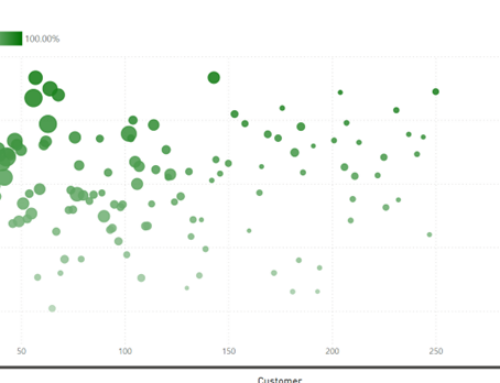What Happens When Accountants Don’t Understand ERP Software in Manufacturing Accounting
Accountants play a much-needed role in businesses of all sizes and industries, especially when it comes to enterprise resource planning (ERP).
Understanding how to implement and work with ERP software is central to the accounting team’s success. Experienced accountants are vital to an organization’s future success.
In this article, we’ll explore the consequences of not understanding ERP software and how these challenges impact businesses.
The growing complexity of integrating ERP systems
The escalating complexity of ERP systems in manufacturing presents substantial challenges that directly affect companies without in-depth ERP system expertise at their disposal.
Organizations in this situation face issues with system compatibility, compliance, and scalability. These problems are further exacerbated by a skills gap and labor shortage that feeds the scarcity of accountants proficient in ERP.
The American Institute of Certified Public Accountants (AICPA) reports a steady decrease in new students majoring in accounting. It estimates that about 75 percent of CPAs reached retirement eligibility in 2020—leaving a massive gap in accounting resources for businesses across the globe.
This scenario is problematic because accountants serve as stewards of information, navigating the intricate requirements of different industries while upholding the essential checks and balances.
Therefore, it’s imperative for businesses, particularly those without specialized accounting skills, to find ways to fill their knowledge gap and manage ERP systems effectively.
What are the consequences of not understanding an ERP system?
There are several consequences of not understanding an ERP system. Employee comprehension of ERP systems is crucial for enterprise accountants to avoid significant setbacks. When employees don’t understand a system, productivity stops while they teach themself.
Not utilizing or incorrectly using a necessary tool like an ERP system can wreak havoc on a manufacturing business. The following sections explore six critical consequences that stem from the lack of understanding of ERP.
1. Limited accessibility for troubleshooting
Businesses today rely on multiple programs, tools, and apps to access the data needed to make decisions for the company’s future.
Information silos hinder effective time management and operational visibility across departments and locations. ZenDesk reports a small fraction (22 percent) of business leaders say their teams share data well.
What’s more, IBM reports 82 percent of enterprises are inhibited by data silos. Information silos between different software lead teams to take system-generated data at face value without getting the support that advises, troubleshoots, and verifies accurate financials.
When accountants lack an understanding of ERP software, they can face challenges trying to troubleshoot these issues, leading to prolonged downtime, hindering the timely resolution of accounting-related problems, impacting the efficiency of manufacturing processes, and impeding management’s decision-making abilities.
2. Complications to business-wide ERP adoption
ERP software adoption is fraught with notable challenges. Specifically, implementing industry-specific ERP applications and the hurdles in training staff for their practical use.
In a manufacturing setting, accountants need an understanding of the manufacturing process to correctly advise on the best practices for data entry at different stages. This knowledge gap can lead to significant data inaccuracies and reporting errors, adversely affecting crucial business decisions.
The core issue lies in the disconnect between the software’s capabilities and the users’ understanding of its application in their specific work environment. When accountants fail to recognize errors in the data due to their limited insight into manufacturing processes, they can’t advise on best practices for users in optimizing the ERP system.
Therefore, a comprehensive understanding of ERP software and specific industry processes is vital for accountants to ensure effective adoption and utilization in business settings.
3. Inefficiencies in accounting processes
Manufacturing accounting processes can become inefficient when accountants don’t understand ERP software.
The accounting department may begin performing time-consuming processes manually or designing workarounds for tasks that the ERP software could automate, leading to data collection errors, inaccurate reports, and a lack of real-time information.
These missteps hinder management’s ability to make informed decisions, maintain accurate financial records, and comply with regulations.
4. Inability to implement insightful ERP integrations
When an accountant doesn’t understand core ERP systems, they can’t develop innovative integrations. For instance, your accounting department might not be aware that integrating QuickBooks Online with certain ERPs can enhance the results and impact of your resource planning.
Another program that’s a beneficial business intelligence (BI) integration with your ERP program is Microsoft’s Power BI. Accountants unfamiliar with Power BI won’t know when to tell you it’s time to consider adding the program to your stack.
5. Impact on business decision-making
The consequences of accountants not grasping ERP software are far-reaching. This lack of understanding manifests in a few key operational challenges.
For instance, accountants may face hurdles in accessing real-time data, struggle to offer precise financial insights, and find it tough to utilize ERP data for forecasting. This problem inevitably leads them to miss fundamental errors and issues supplying actionable data for business decisions.
These issues have a ripple effect on the broader strategic decision-making process within a manufacturing business. A deficient understanding of ERP software can be a bottleneck, affecting a manufacturing business’s performance and ability to compete effectively in the market.
6. Compliance challenges
Enterprise businesses must adhere to various regulatory standards and compliance requirements.
Not understanding or properly using an ERP program leads to an increased risk of non-compliance with financial regulations, difficulties meeting audit requirements, and challenges maintaining accurate financial records.
Without an understanding of ERP software, accountants can’t ensure compliance, which can lead to non-compliance issues and the associated fines and other penalties.
What is the role of an outsourced accounting and advisory team in ERP implementation?
The role of outsourced accounting and advisory in ERP implementation is to help businesses handle and address the many abrupt changes to the status quo that occur.
Manufacturing businesses can benefit from an outsourced accounting and advisory team’s specialized expertise in ERP implementation, data management, and financial advisory services.
When partnering with an outsourced team, manufacturing businesses can bridge the knowledge gap and ensure a smooth transition to ERP systems.
Conclusion: Chortek knows enterprise resource planning
Accountants face unique and significant challenges, particularly in understanding and implementing enterprise resource planning.
The lack of ERP knowledge leads to limited troubleshooting ability, complications in ERP adoption, inefficiencies in accounting processes, the inability to implement innovative ERP integrations, negative impacts on business decision-making, and compliance challenges.
These issues underscore the critical role of accountants skilled in ERP. As the industry evolves, businesses must prioritize equipping their accounting teams with the necessary ERP skills or consider partnering with outsourced accounting and advisory teams. This approach will not only address the immediate challenges but also position these businesses for long-term success in a competitive market.
When you address these challenges, your manufacturing business can significantly improve its operational efficiency, cost management, and overall sustainability.
Contact the outsourced accounting experts at Chortek to augment your ERP accounting needs.




